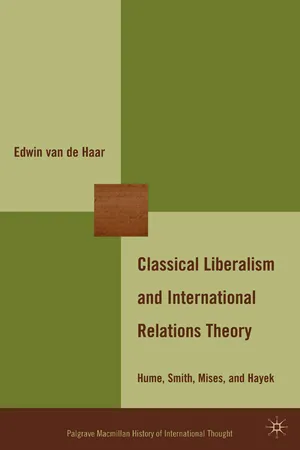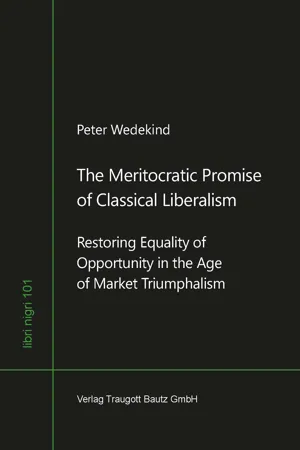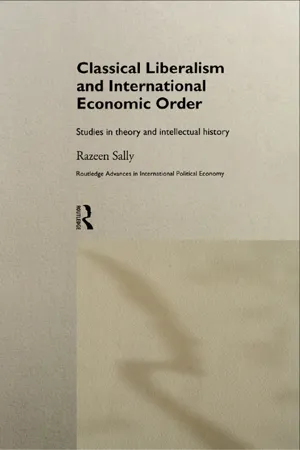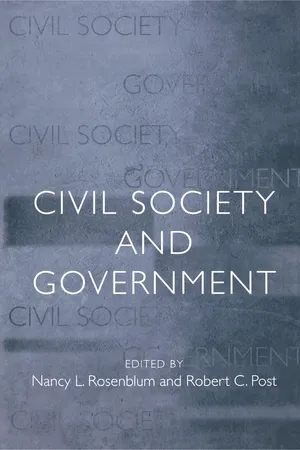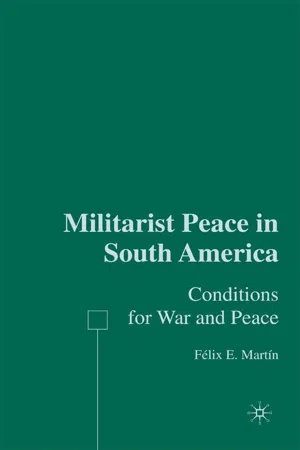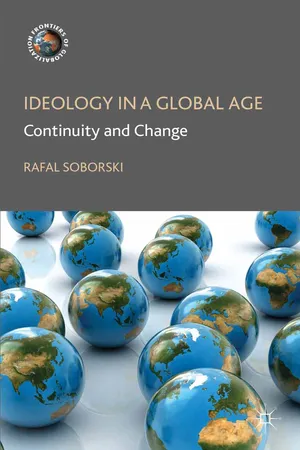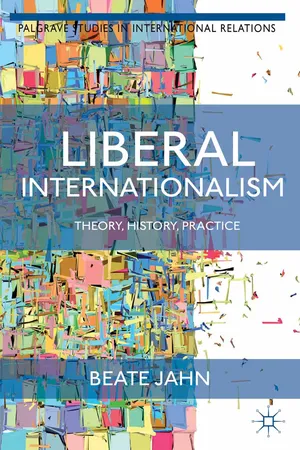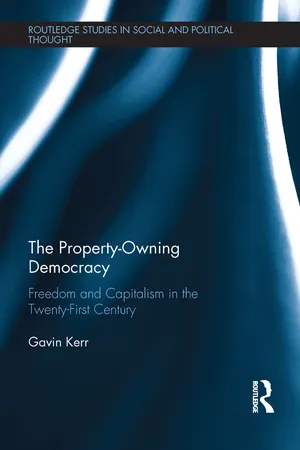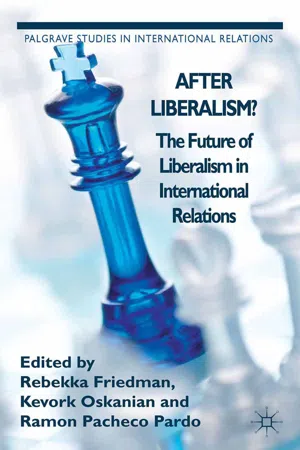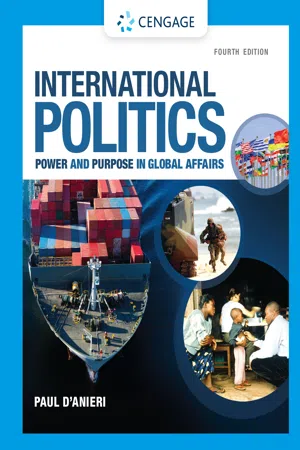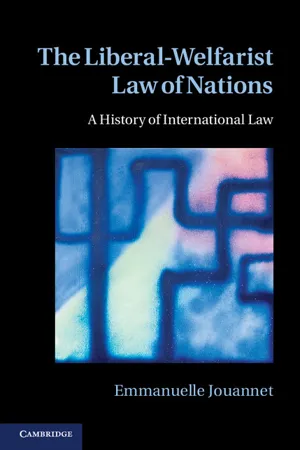Politics & International Relations
Classical Liberalism
Classical liberalism is a political ideology that emphasizes individual freedom, limited government intervention in the economy, and the protection of private property rights. It advocates for free markets, civil liberties, and the rule of law. Classical liberals believe that individuals should have the freedom to pursue their own interests and that government should primarily exist to protect these liberties.
Written by Perlego with AI-assistance
Related key terms
1 of 5
11 Key excerpts on "Classical Liberalism"
- eBook - PDF
Classical Liberalism and International Relations Theory
Hume, Smith, Mises, and Hayek
- Kenneth A. Loparo, Edwin van de Haar(Authors)
- 2009(Publication Date)
- Palgrave Macmillan(Publisher)
Undoubtedly, some will be surprised by the argument, because a significant number of current classical liberals have been rather happy to embrace the moral high ground in international affairs, as associated with many of the social liberal posi- tions to be discussed in the second part of this chapter. Therefore, they 126 ● Classical Liberalism and IR Theory will be surprised to learn that Classical Liberalism in international relations entails for example the rejection of the relation between peace and trade, or the calm acceptance of war as a regular institution in international affairs. Still, the theory outlined below is a consistent application of the classical liberal principles and views, which calls for reflection and then rejection of the previously held positions. Insofar that a number of classical liberals have taken a long hike from international reality, it is now time for them to face the difficulties and the ugliness often associated with world politics. Perhaps this process is made easier by the fact that a key aspect of classi- cal liberalism is its application of the same core principles to domestic and international politics, while acknowledging the differences between these two spheres of political action. The ultimate goal of Classical Liberalism in international affairs is the same as in domestic politics: to maximize indi- vidual freedom for all people in the world. The outline of the theory follows the presentation of the classical lib- eralism elements in chapter 2. This is a straightforward way to show that the theory is indeed classical liberal and that it follows the same bottom-up approach to politics. In the process, the relation with the Grotian position in English School theory is emphasized. In the second part of the chapter, the main differences with other liberalisms in IR theory are highlighted. The Individual and Freedom International relations are all about human action. - eBook - PDF
The Meritocratic Promise of Classical Liberalism
Restoring Equality of Opportunity in the Age of Market Triumphalism
- Peter Wedekind(Author)
- 2023(Publication Date)
- Traugott Bautz(Publisher)
As Gaus et al. ([2003] 2020) argue, we must come to realize that “liber- alism is more than one thing. On any close examination, it seems to fracture into a range of related but sometimes competing visions”. In contemporary public policy debates, ‘liberalism’ typically refers to a new or revised brand of liberal doctrines (Gaus, Courtland, and Schmidtz [2003] 2020). Such lib- eralism is usually associated with greater social justice as well as welfare state policies, and it tends to call into question the intimate relationship between individual liberty and private property based on the mechanism of the mar- ket order (Gaus, Courtland, and Schmidtz [2003] 2020). Such reinterpreta- tion of the term embodies an alternative vision of liberalism in opposition to 3 The following distinctions and core features of classical liberal thought correspond to the definitions previously provided in my (2020b) reevaluation of the merits of liberal democracies in contemporary global political philosophy. Liberalism: An Unfulfilled Promise? 33 John Locke’s, Adam Smith’s, and John Stuart Mill’s ‘old’ classical liberal framework as well as the revised neoliberal versions of Ludwig von Mises, Friedrich August von Hayek, and others (Wintrop 1985, 91). In this book, ‘liberalism’ predominantly refers to Classical Liberalism. And yet, it must be added that even classical liberals disagree about the concrete features of the term and their definitions differ correspondingly. Fortunately, there is at least one set of basic principles to be found that most scholars of Classical Liberalism would agree upon: Individualism, freedom, natural law, spontane- ous order, rule of law, and limited state. 4 Unlike versions of collectivist or communitarian doctrines that are pre- dominantly concerned with the wellbeing of the community, individualism emphasizes the rights and the value of the individual (Haar 2009, 20–23). - eBook - ePub
Classical Liberalism and International Economic Order
Studies in Theory and Intellectual History
- Razeen Sally(Author)
- 2002(Publication Date)
- Routledge(Publisher)
Part I The foundations of Classical LiberalismPassage contains an image
2 What is Classical Liberalism?
DOI: 10.4324/9780203006993-2It is no exaggeration to say that it is impossible to understand the evolution and the meaning of Western liberal civilisation without some understanding of classical political economy.Lord RobbinsThe main merit of the individualism which [Adam Smith] and his contemporaries advocated is that it is a system under which bad men can do least harm. It is a social system which does not depend for its functioning on our finding good men for running it, or on all men becoming better than they now are, but which makes use of men in all their given variety and complexity, sometimes good and sometimes bad, sometimes intelligent and more often stupid.F.A.HayekThis chapter presents an overview and synthesis of Classical Liberalism in political economy, drawing on a tradition spanning over two centuries of thought. It emphasises the differences between classical liberal political economy and other ‘liberalisms’, particularly the kind of liberal theory based on the rational actor/perfect markets paradigm in neoclassical economics. The aim of the chapter is to lay the groundwork for the studies to come in the book. An overview of Classical Liberalism is the entry point to, and context for, separate considerations of the Scots (Smith and Hume), Americans (Knight and Viner), Germans (Eucken, Böhm and Röpke) and others (such as Tumlir) in a common intellectual tradition.Further, the reader should note that the presentation of Classical Liberalism here, in its general contours, is primarily relevant to domestic or national political economy, that is, what happens within the nation-state. Prima facie, this might seem inappropriate or not particularly relevant to a book on international political economy. However, it is indispensable if the end-objective is to present a classical liberal argument on international economic order, for, as we shall see in later chapters, the latter requires an investigation of the domestic or national preconditions of international order - eBook - ePub
- Nancy L. Rosenblum, Robert C. Post, Nancy L. Rosenblum, Robert C. Post(Authors)
- 2021(Publication Date)
- Princeton University Press(Publisher)
Classical Liberalism and Civil Society: Definitions, History, and Relations Tom G. PalmerCLASSICAL LIBERALISM has been so successful in so many ways that it is often taken for granted. Indeed as Fareed Zakaria has pointed out,Classical Liberalism, we are told, has passed from the scene. If so, its epitaph will read as does Sir Christopher Wren’s, engraved on his monument at St. Paul’s Cathedral: “Si monumentum requiris, circumspice.” If you are searching for a monument, look around. Consider the world we live in—secular, scientific, democratic, middle class. Whether you like it or not, it is a world made by liberalism. Over the last two hundred years, liberalism (with its powerful ally, capitalism) has destroyed an order that had dominated human society for two millennia—that of authority, religion, custom, land, and kings. From its birthplace in Europe, liberalism spread to the United States and is now busily remaking most of Asia.1Naturally, the consequence is that the greatest disputes about policy take place at the margins. But debates about principles often go toward the core, rather than remaining on the margins. Differing conceptions of rights and justice, for example, are often at great variance, and if consistently carried out would lead to dramatically different policy outcomes. So while critics of Classical Liberalism—whether communitarians, welfare-state liberals, socialists, nationalists, or other collectivists—may offer what seem marginal changes from classical liberal policies, their core principles, if consistently carried through, could lead effectively to the elimination of liberal principles, policies, and practices. - eBook - PDF
Militarist Peace in South America
Conditions for War and Peace
- F. Martín(Author)
- 2006(Publication Date)
- Palgrave Macmillan(Publisher)
The result of this practice is a hydra-headed international liberal paradigm, lacking a core set of assumptions and internal logical consistency. Therefore, to clarify and structure the theoretical background of the liberal hypotheses to be evaluated here, it will follow an examination of the evolution of liberalism from a doctrine of individual liberty to a major approach in international relations, leading to several liberal analytical variants. To elucidate this angle, it is useful to briefly specify liberalism’s historical origin and the relation to its normative content. Classical Liberalism stems in part from a reaction against both the monarchical and mercantile systems in Europe during the seventeenth and eighteenth centuries, which interfered with the political and economic interests of an emerging middle-class society. 6 Hence, one dimension of liberalism “deals with political freedom—freedom for the citizen from state oppression,” and from this position, as Giovanni Sartori affirms, its core concern is “the juridical defense, through the constitutional state, of individual political freedom, of individual liberty.” 7 Also, liberalism deals with economic freedom—freedom from the state meddling in the economic pursuits of individuals. This aspect of liberalism stresses that the individual can be relied on, without state control, to advance the interests and welfare of the community as a whole. 8 Although similarly aiming to enhance and protect individual liberty in society, these twin liberal dimensions have prompted students of liberalism to differentiate between politics and economics as “separable and autonomous spheres of activi- ties.” 9 To illustrate this point with a statement from a liberal international relations scholar, let us hear from Edward L. Morse, who argues that “one of the core assumptions in the Westphalia system was the tight relationship between—if not the equation of—economic and political goods. - eBook - ePub
Ideology in a Global Age
Continuity and Change
- R. Soborski(Author)
- 2013(Publication Date)
- Palgrave Macmillan(Publisher)
5 This way of thinking had been present in Classical Liberalism far in advance of the neoliberal fixation on globalization and the similarities between classical liberal interpretations and ‘globalist claims’ are not just erratic overlaps but represent an organic continuity. In the next section, I develop my argument by comparing what Steger demarcates as ‘globalism’ with the key concepts of Classical Liberalism as an ideology that ‘has always been about globalization’ (Young 2002: 173). I substantiate my conceptualization of this set of interpretations as liberal by examining their interaction with the principle of liberty and their compatibility in the context of liberalism’s universalist approach. While the classical liberal concept of globalization is contingent on this ideology’s understanding of liberty and universalism, the meanings of these extremely capacious fundamentals are in turn updated to novel circumstances in the process of Classical Liberalism’s engagement with the new concept.Classical Liberalism: Liberty, markets and globalizationThe broad characteristics of the classical liberal understanding of what liberty is, and why it could, and should, be universalized derive from the socio-historical milieu in which Classical Liberalism came into being. As a comprehensive political doctrine, Classical Liberalism emerged in the late eighteenth century. It was an expression of the aspirations of the bourgeoisie, the class that had rejected the rule of absolute monarchs and the unearned privileges of the aristocracy and that was in the process of giving rise to full-blown capitalism. Accordingly, the classical strand of liberalism understands the core component of liberty to be freedom from undue fetters imposed by all overtly non-meritocratic systems of social stratification. This classical liberal concept of liberty has been made to work on behalf of the economic and political priorities of the bourgeoisie and has thus become associated with the functioning of the bourgeois economic system freed from arbitrary feudal obligations.The liberal glorification of the market brings together several threads. The free-market economy is held to be relentlessly efficient and, by implication, the only reliable way to eliminate poverty and destitution. Furthermore, the free market is elevated to the status of a paradigmatic arrangement of any free society, a perfect mechanism not just for the running of the economy but also for the modelling of other spheres of social life. Markets are believed to promote vital moral qualities that are conducive to the ‘good life’ in society. Economic freedom is conceptualized as underpinning political freedom and economic liberalization is said to entail democratization although, as I pointed out earlier, it is important to note that this view tends to be compromised either on the more ‘social’ edge of Classical Liberalism where emphasis may be shifted towards a different set of prerequisites for democracy (Sachs 2011) or on liberalism’s somewhat ‘conservative’ periphery where the objective of democratization may be de-emphasized altogether (Lal 2000, 2006). What applies to domestic affairs is also upheld with regard to the international stage. Here, the expansion of free markets is posited by classical liberals as the most reliable guarantee of peace and stability of the international system. - eBook - ePub
Liberal Internationalism
Theory, History, Practice
- B. Jahn(Author)
- 2013(Publication Date)
- Palgrave Macmillan(Publisher)
3 Classical Liberal TheoryIntroductionLiberal internationalism is a composite and dynamic phenomenon: it is made up of a number of different political, economic, and ideational principles and practices which, moreover, change over time and take on different forms in different social and political contexts. The form and meaning of liberal internationalism is thus constantly in flux and it is this multifaceted nature and historical fluidity that presents a challenge to conventional forms of definition that aim to fix meaning in time and space.And yet, the terms ‘liberal’, ‘liberalism’, ‘liberal internationalism’ are widely used in academic and political discourse. Though this usage clearly entails a variety of meanings – with different associations in Europe and America, for instance – it arguably also attests to the fact that the common connotations of these terms outweigh their differences. Within a political context such terms need to effectively provide common ground for (or against) a cause, otherwise they fail to fulfill their most important function. Of course, a variety of associations with a particular term can be very useful, in that it mobilizes and brings together different constituencies. Yet, even in that case some minimal common ground or assumed linkage between the different meanings is necessary – otherwise political fragmentation is bound to result. Hence, if we are to analyze liberal (international) policies or even a liberal world order, it is necessary to attempt a clarification of these terms. - eBook - PDF
- Gavin Kerr(Author)
- 2017(Publication Date)
- Routledge(Publisher)
Classical Liberalism and Market Freedom 35 political values. Contrary to what is implied in Berlin’s remarks on value pluralism and the dangers of monism, the values of negative liberty, pos- itive liberty, and equality can overlap as well as clash and collide: from the fact that unrestricted market freedom is undoubtedly incompatible with full substantive equality, it does not follow that more strongly protected market freedom necessarily means more socio-economic inequality, or that less strongly protected market freedom necessarily means less socio- economic inequality; and it cannot simply be assumed that the poverty and deprivation which were widespread in industrializing, ‘laissez-faire’, liberal democratic societies in the nineteenth century were the result of excessively strongly protected negative liberty, preventable only through the imple- mentation of interventionist, redistributive, and regulatory mechanisms that would have restricted market freedom. For reasons which I hope will become clearer as the argument of the book develops, I believe that such assumptions reflect a particular (mis) interpretation of the idea of market freedom which may be challenged and rejected. More specifically, I shall argue that these assumptions can be accepted only by those who adopt, whether implicitly or explicitly, what I have referred to as the orthodox classical liberal interpretation of the idea of market freedom, that is, an interpretation that identifies the prioritiza- tion of this form of freedom in terms of what I have referred to in the Introduction to this chapter as the minimally conditional protection of rights of full liberal ownership in respect of a wide range of forms of prop- erty, including land and natural resources. - eBook - ePub
After Liberalism?
The Future of Liberalism in International Relations
- R. Friedman, K. Oskanian, R. Pachedo Pardo, R. Friedman, K. Oskanian, R. Pachedo Pardo, Kenneth A. Loparo, Ramon Pacheco Pardo, R. Friedman, K. Oskanian, R. Pachedo Pardo, Ramon Pacheco Pardo(Authors)
- 2013(Publication Date)
- Palgrave Macmillan(Publisher)
In contrast to this spread of liberal norms, practices, and institutions, power politics generally associated with realism characterised the prior Cold War period. Capitalism, free trade, and free market principles were confined to the Western sphere of influence and tempered, domestically and internationally, by considerations of political stability. Democracy promotion was equally restricted and generally trumped by power political considerations; hence extensive alliances with authoritarian states and interventions in support of sympathetic rather than democratic regimes predominated. Human rights were generally subordinated to the principle of sovereignty. In short, the “rise” of liberalism was associated with the increase in policies explicitly designed to spread liberal norms, practices, and institutions. And it was the retreat from these policies towards the end of the 1990s and a more explicit turn towards traditional power politics after 9/11 that seemed to indicate a “fall” of liberalism.On closer inspection, however, liberalism cannot unequivocally be identified with these policies. While democracy is today widely seen as a core characteristic of liberalism, liberals were historically passionately opposed to democracy. Meanwhile, calling the recent policies of economic liberalisation, deregulation, and privatisation, “neoliberal” indicates some continuity with the laissez-faire policies of Classical Liberalism. And yet, the Cold War settlement of large parts of the world economy was also characterised as (embedded) liberalism. And even though liberal states are today associated with the protection of individual freedom and respect for human rights, the very same norms coexisted historically with the practice and justification of slavery.These examples show, firstly, that liberalism is historically linked to a much wider range of policies, institutions, and norms than is recognised in the contemporary conception. Secondly, there is no doubt that liberalism is a dynamic historical phenomenon, which changes over time and from place to place. Thirdly, different liberal norms, institutions, or policies may well stand in tension to each other. And this provides a challenge for the definition of liberalism. Indeed, the fact that liberalism is “quite diverse”, has not “evolved in a singular linear fashion”, and is “marked by levels of disagreement and variation” is widely interpreted to stand in the way of an encompassing definition which would “paper over significant differences” (Tansey, 2008: 90–91). Consequently, scholars tend to focus on the one or other aspect of liberalism. - No longer available |Learn more
International Politics
Power and Purpose in Global Affairs
- D'Anieri, Paul D'Anieri(Authors)
- 2016(Publication Date)
- Cengage Learning EMEA(Publisher)
The politi-cal theorist John Locke and later liberals argued, contrary to Hobbes, that individuals could freely join together to form governments that would protect them from anarchy without resorting to authoritarianism. The limitation of state power and the guarantee of the rights of individuals are still the core of liberalism (which, in contemporary usage, is often simply called democracy ). The central philosophical insight of liberal international theory is that it is possible to overcome the worst aspects of the realist world. Indeed, liberals argue, because the world described by the realists is so dangerous, states and other actors have a powerful incen-tive to try to escape from that system, or at least to moderate its worst effects. Whereas realists are utterly pessimistic about the possibility of doing so, liberals are a bit more optimistic. They do not necessarily see people as “good” or inherently peaceful, but they do see people as being smart enough to recognize the problems created by international anarchy and to work to overcome them. The most prominent assumption shared by all liberals is that people are rational and understand their interests. This faith in human reason leads domestic liberals to believe that liberal democracy is the best form of government and leads international liberals to believe that rational, self-interested states and leaders can overcome the problems of anarchy. Liberalism is a much more diverse body of theories than realism, however, and is therefore more difficult to summarize coherently. This book highlights three different strands of liberal theory, each of which departs from realism in a different way and each of which focuses on a different level of analysis. One way to depart from realism is to rethink the implications of anarchy. This school, known as liberal institutionalism, agrees with realism that anarchy creates a security dilemma in which states’ efforts to gain security cause insecurity instead. - eBook - PDF
The Liberal-Welfarist Law of Nations
A History of International Law
- Emmanuelle Jouannet, Christopher Sutcliffe(Authors)
- 2012(Publication Date)
- Cambridge University Press(Publisher)
That alternative could have found the principle for its solution in a revamped variant of liberal international law, provided it had been freely consented to by non-European peoples. But no one imagined it in this way at the time and all of these principles were thought out and practised in such a way that they became a legal obstacle to the insertion of other political entities. Instead of being a small set of formal and neutral principles cap- able of catering for different concrete contents, for societies with variable forms and political regimes, they were thought of as a set of material principles reflecting a substantive conception of law and of the state, which was itself the direct reflection of the European situation of the age. Far from being neutral and formal, classical international law reflected a choice of values and a liberal ideology that were paradoxically to make it discriminatory and anti-liberal. Its neutrality flew into pieces upon con- tact with non-Europeans. Therefore everything, in fact, depended on the context in which lib- eralism was deployed and the actual uses made of it, for it is a deeply ambivalent ideology that can either emancipate or dominate. It was this ambivalence that was intrinsic to liberalism that explains so paradoxical a development of classical international law, the fact that a pre-eminently liberal law also contained the rules that were to consolidate European colonial domination. And so it was above all the intellectual and eco- nomic context of the time that tilted the ambivalent effects of liberalism to the side of domination. As Jennifer Pitts has so finely shown, the context of nineteenth- century Europe fully explains this attitude of the liberal intellectual elite The liberal-welfarist law of nations 144 and therefore of international legal scholars.
Index pages curate the most relevant extracts from our library of academic textbooks. They’ve been created using an in-house natural language model (NLM), each adding context and meaning to key research topics.
